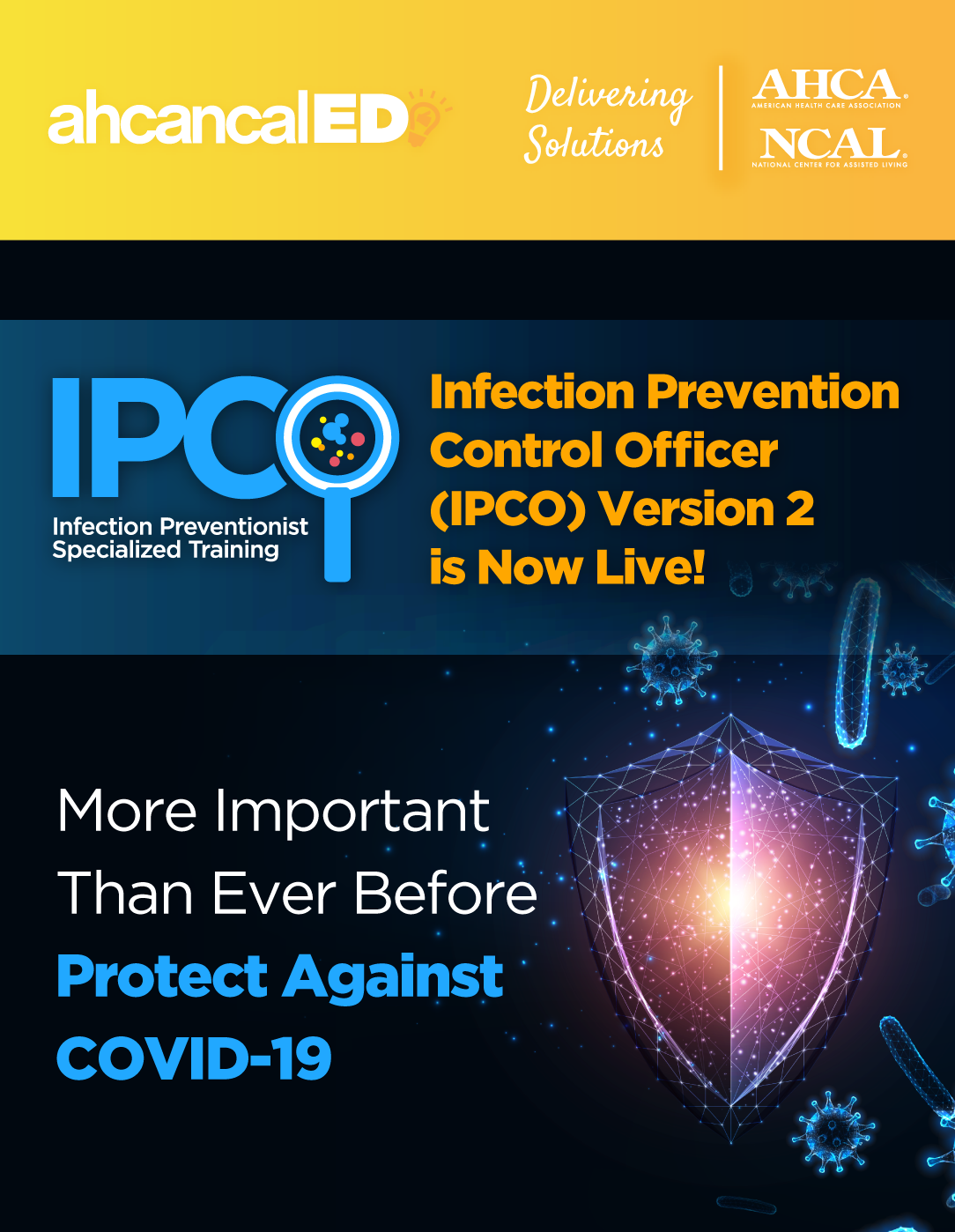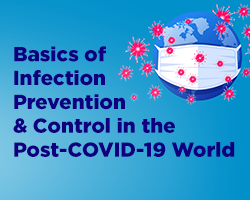

Quality Award Examiner Trainings | Visit here
-
Contains 5 Component(s)
The annual inspection and testing of fire rated door assemblies became a requirement for all healthcare occupancies, including skilled nursing facilities, when CMS adopted the 2012 edition of the Life Safety Code®. The Code specifies that the testing and inspection should be performed by individuals who can demonstrate “knowledge and understanding” of the doors subject to the testing.
This training module is intended to educate maintenance, physical plant, and/or facility services personnel on the various components of a fire door assembly and how to develop, conduct, and document a comprehensive fire door inspection and testing program. With the successful completion of a quiz at the conclusion of the module, a certificate of completion will be provided. This certificate should be available during survey and will serve as evidence of competency.
Inspection, testing and maintenance of building life safety components is a critical part of maintaining life safety compliance and overall survey readiness.
These materials have been updated as of 08/07/25
Registration is free to AHCA/NCAL members.
Instructions to Register:
- To avoid technical problems, use Google Chrome.
- Members will need to log in using their existing email and password first.
- Once you are logged in to the website, you will be able to register by clicking the green register button at the top of the page.
- If you have forgotten your password, click here.
- If you are new to the site, you can create an account here. Answer all fields on the create an account page- especially locating your company name. You can search by name or zip code. After creating an account, you will be able to register for the training.
Instructions to begin, after registering:
- To begin the training, click on the Contents tab.
- Participants must watch the video and pass the quiz in order to open their certificate of completion.
Email educate@ahca.org if you need assistance.
© 2025 American Health Care Association. All rights reserved.
All Life Safety: Fire and Smoke Door Inspection Training materials subject to this copyright may be photocopied or distributed for the purpose of nonprofit or educational advancement. The use, photocopying, and distribution for commercial purposes of any of these materials is expressly prohibited without the prior written permission of American Health Care Association.
-
Register
- Member - Free!
- *Further discounts may apply once you log in.
- More Information
-
Contains 34 Component(s), Includes Credits
Component Credit Type State/Medical Type Available Credits Earned Credits Certificate of Completion Medical IBON 4.50 0.00 
This four-module course is designed to improve person-centered care for post-acute care (short stay) residents under the PDPM payment system. Since the PDPM model was a wholesale shift in payment and delivery, initial training mechanisms focused on the new system components. Now that those immediate change needs have been adopted, education and training on best practices for implementing person-centered care should be reviewed to fully adopt CMS’s vision for the PDPM model. This course will define person-centered care and show how it is a key feature in PDPM and when implemented can improve care practices that lead to better patient outcomes.
Designed to be appropriate for all facility staff, the first 3 modules can be done as a team or individuals. The final module consists of role-specific course content for either administrators, clinical professionals (Nursing/Rehab therapies), Nursing Assistants, or other essential facility staff. The presentation modules and accompanying fact sheets, and either team exercise or case studies, are designed to promote team application of the concepts into their clinical practice and to elevate person-centered care throughout the organization.
Course Objectives: Upon completion, the learner will be able to:
1. Recognize how person-centered care is the core of the PDPM payment model.
2. Define the core components of person-centered care.
3. Consider best practices to incorporate person-centered care into everyday interactions and care plans for short-stay residents.
4. Identify tools to assess person-centered care practices.
5. Review the key components of teamwork and communication required for person-centered care.
6. Review of activities and other programs that can impact facility-wide adoption of person-centered care.
Cost:
$150 AHCA/NCAL Members
$300 Non-members
Discounts are available when registering five or more individuals.
Continuing Education:
4.50 contact hours.
Need assistance? Email educate@ahca.org
© 2022 American Health Care Association. All rights reserved.
All Person-Centered Care In A PDPM World materials subject to this copyright may be photocopied or distributed for the purpose of nonprofit or educational advancement. The use, photocopying, and distribution for commercial purposes of any of these materials is expressly prohibited without the prior written permission of American Health Care Association.
Cathy Ciolek, DPT, GCS, FAPTA
President of Living Well With Dementia, LLC
Dr. Ciolek is President of Living Well With Dementia, LLC- providing education and consultation to promote well-being and positive expectations for people with dementia. She has nearly 30 years physical therapy clinical experience working with older adults across the continuum of care including as staff PT, Director of PT and Director of Rehab in a skilled nursing facility and a not-for-profit continuing care retirement community. She served as Regional Director for the Pennsylvania Restraint Reduction Initiative (PARRI) and as a faculty member in the Department of Physical Therapy at the University of Delaware. Additionally, Cathy is Board Certified Geriatric Clinical Specialist, a Certified Dementia Practitioner® as well as a Certified Alzheimer’s Disease and Dementia Care Trainer®. She was recently recognized as a Catherine Worthingham Fellow of the American Physical Therapy Association for her advocacy efforts for older adults.
How can an organization register as a group and pay?
AHCA offers the following discount structure for groups:
- 5-9 - $10 off each
- 10-19 - $15 off each
- 20 or more - $20 off each
Payment for group registration will need to be in the form of a check. To make the payment, follow these instructions:
- Email educate@ahca.org to request a payment form. A representative at this email address will forward to you a payment form and spreadsheet.
- Both payment form and spreadsheet detailing individual registrants should be returned to educate@ahca.org.
- The payment form along with full payment should be remitted to AHCA/NCAL, ATTN: Finance Department, 1201 L Street, NW, Washington, DC 20005.
- Once payment is confirmed and registrant information has been processed, individual registrants will receive an e-mail from educate@ahca.org with information to access the Training.
Please contact educate@ahca.org if you have any questions.
When purchasing online with credit card, follow the instructions below. Please note, this option is for groups with less than 5. The discount noted above will not apply.
Please use Google Chrome for the best user experience. One individual can purchase multiple registrations for more participants by adding them to their cart during the checkout process. Please note, for this option to work, every participant will need to have an ahcancalED account first.
To add several participants, please click the green button in the cart that says:
 .
.
You will then be able to search for more than one participant using their email address. If the person making payment should not have access to the course, then you can remove yourself by clicking the red "remove" button by your name.

*Payment Tip: The price of the training will be based on each registrant’s member type (member or non-member). please be sure when you are paying with a credit card the bill-to and shipping address are the same*
If you need assistance, please email educate@ahca.org
-
Register
- Non-member - $300
- Member - $150
- *Further discounts may apply once you log in.
- More Information
-
Contains 2 Component(s)
This course is free and was designed to meet the critical staff shortages occurring as a result of COVID-19. You will need to register and create an account using your name and e-mail. Once you have created your account, you may complete the course on your own time, stopping as needed, and then rejoining the class wherever you left off.
Completion of this training is intended to prepare you to develop, manage and maintain a surge plan.
Key Takeaways
- Types of Surge (Begins at 9-minute mark)
- Components of a Surge Plan (Begins at ~10:48 minute mark)
- Space – Structure
- Staff – Identifying staff requirements
- Stuff – Equipment and Supplies Needed
- Systems – Policies and Procedures to keep residents and staff safe
- Safety – Providing a safe environment for residents, staff and visitors
- How to Develop your Surge Plan (Begins at ~16:55 minute mark)
- Understand the lifecycle of a surge event
- Include Infectious Disease Expert when developing plans, team effort to develop
Presented by RPA, a Jensen Hughes Company
Main Office, 500 CrossKeys Office Park
Fairport, NY 14450
© 2022 American Health Care Association. All rights reserved.
All How to Prepare your Facility for Surge materials subject to this copyright may be photocopied or distributed for the purpose of nonprofit or educational advancement. The use, photocopying, and distribution for commercial purposes of any of these materials is expressly prohibited without the prior written permission of American Health Care Association.
-
Register
- Non-member - Free!
- Member - Free!
- More Information
-
Contains 4 Component(s)
Post-acute and long-term care facilities provide care and services to vulnerable populations who may become critically ill when steps are not taken to reduce the risk of waterborne diseases. Healthcare facilities are integral to the health and well-being of the communities and residents they serve. In order to maintain daily operations and care services, healthcare facilities need to develop an effective water management plan to prepare for, respond to, and recover from a total or partial interruption of the facility’s normal water supply. The water management course will provide post-acute and long-term care facilities with information on what a water management plan is, how to identify the elements of an effective water management program, and how to develop and maintain a comprehensive water management program in your facility.
Audience: appropriate for both NF, as is required by regulation, and as best practices for AL.
Module Outcomes:
- Describe what a water management plan is.
- Identify elements of an effective water management program.
- Discuss how to develop and maintain a comprehensive water management program for your facility.
Registration is free to AHCA/NCAL members.
No CEs awarded upon completion.
© 2022 American Health Care Association. All rights reserved.
All Water Management Training materials subject to this copyright may be photocopied or distributed for the purpose of nonprofit or educational advancement. The use, photocopying, and distribution for commercial purposes of any of these materials is expressly prohibited without the prior written permission of American Health Care Association.
Pamela Truscott, MSN, RN, DNS-CT, QCP
Director, Clinical and Regulatory Services
American Health Care Association
Pamela Truscott, MSN, RN, DNS-CT, QCP is the Director, Clinical and Regulatory Services with the American Health Care Association (AHCA). She joined the AHCA family in June 2019 and has been actively involved with a variety of education, tools, and resources such as: trauma-informed care, behavioral health, functional outcomes improvement, and infection prevention and control. Prior to joining AHCA, Pam worked for the Nebraska Health Care Association as the Vice President of Professional Development for seven years. She is an active member of the American Nurses Association as well as the American Association of Post-Acute Care Nurses. Pam has over 20 years of long-term care experience and shares a passion for growing education and cultivating new leaders in long-term care.
Linda Behan, BSN, RN, CIC
Consultant, Long Term Care Infection Prevention, LLC
Linda Behan BSN, RN, CIC is the Consultant for Long Term Care Infection Prevention, LLC . Linda has been certified in infection prevention and control for over 10 years. She leads a team of Infection Preventionists in developing policies and procedures as well as developing and delivering education across the company. Linda serves on the APIC Professional Development Committee and frequently presents at healthcare and professional organization conferences.
-
Register
- Member - Free!
- More Information
-
Contains 9 Component(s)

Learn how to use LTC Trend Tracker as one of your tools for Quality Improvement. In these videos, you will learn how to utilize and modify the skilled nursing dashboard, provide an overview of several key LTC Trend Tracker features & reports, and uploading skilled nursing data.
Learning Objectives:
- Learn how to utilize and customize the skilled nursing dashboard
- Select benchmark groups to best demonstrate your facility’s strengths
- Understand the measures and upload data
Speaker:
Lonnita Myles, MBA, Manager, Quality & LTC Trend Tracker, AHCA
© 2022 American Health Care Association. All rights reserved.
All How do I use LTC Trend Tracker as a Skilled Nursing Facility? materials subject to this copyright may be photocopied or distributed for the purpose of nonprofit or educational advancement. The use, photocopying, and distribution for commercial purposes of any of these materials is expressly prohibited without the prior written permission of American Health Care Association.
-
Register
- Member - Free!
- More Information
-
Contains 7 Component(s)

How to Register in ahcancalED
Easy as 1, 2, 3 !
Step 1
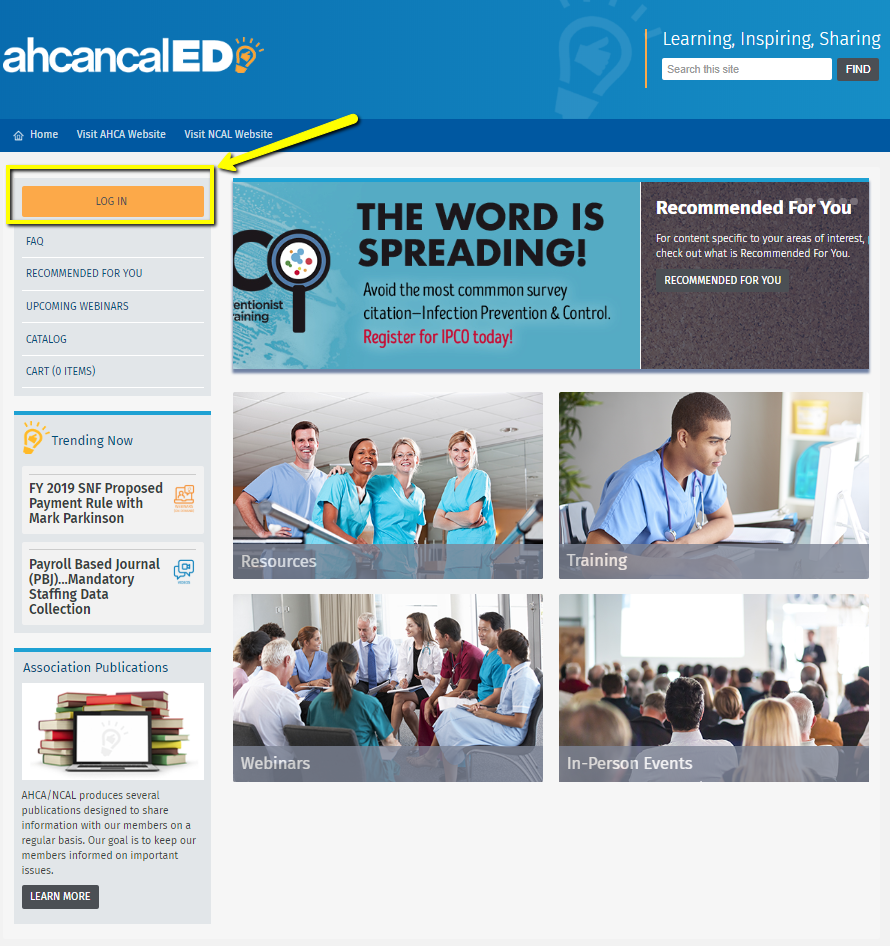
Go to the ahcancalED site at https://educate.ahcancal.org/and log in using the orange button in the upper left hand corner.
Use your usual user name and password that you would use for LTC Trend Tracker or the AHCA NCAL website.
Don’t have one or can’t remember?
Click the log in button and follow the directions found under the search button that reads-“If you need help retrieving your Username or Password, click here”.
*Please note* you must add your member facility name to your login
Once you are in and can see your name in the upper left hand corner, you are ready to go.
Step 2
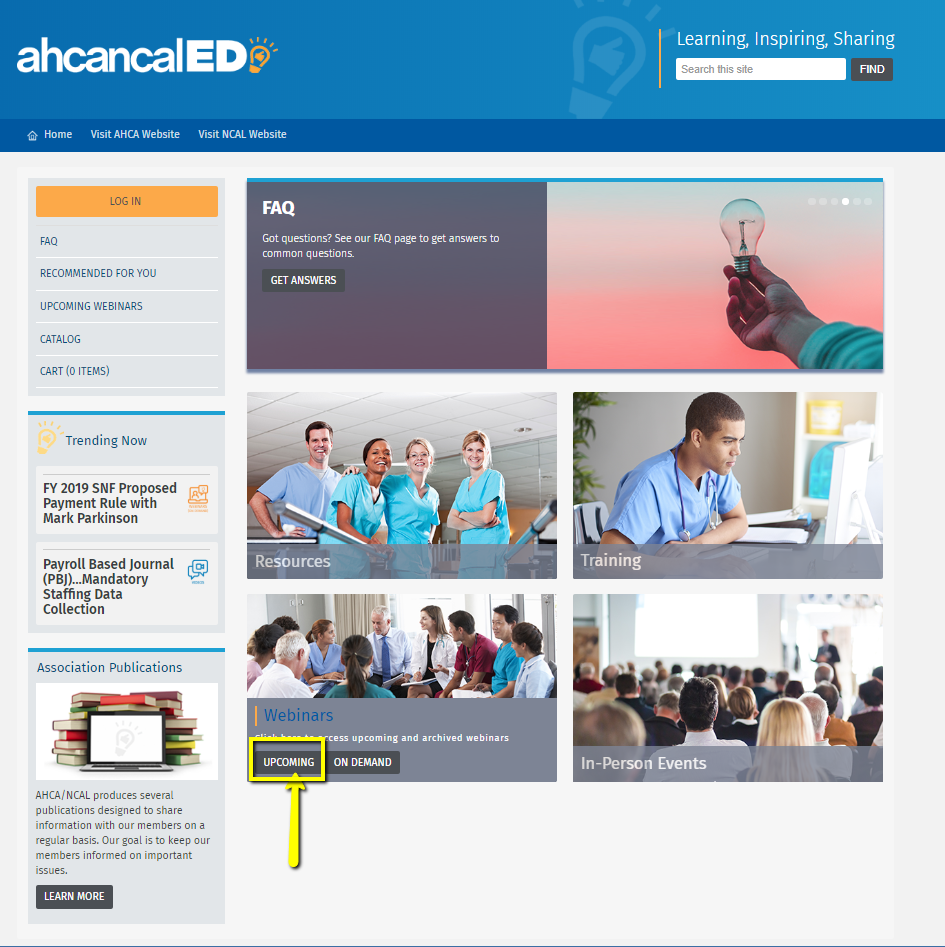
From the home page click on a category (Resources, Training, Webinars or Trending Now) For this demonstration, let’s try hovering over Webinars until upcoming webinars displays.
Under “upcoming webinars” go to a product in which you are interested. Click on the title.
You’ll be redirected to the site where you can register for the product. This allows you to view the overview, handouts or resources associated with that product.
Step 3
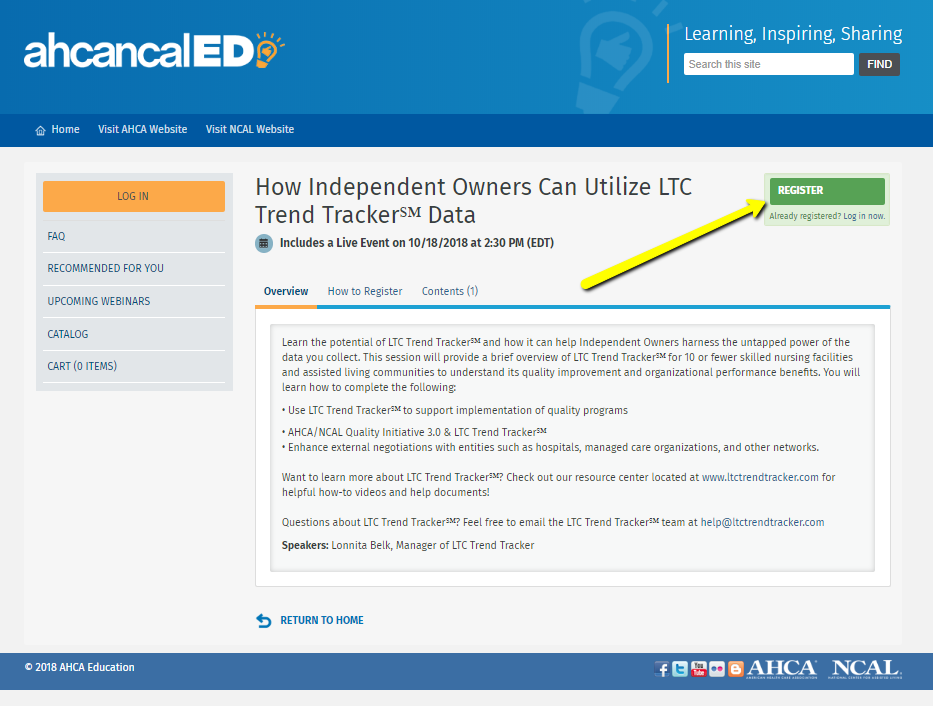
Almost there!
Click the green “register” button.
Fill out the registration details and voila! The products are yours to use indefinitely and can be found in your dashboard.
FYI: after registering, you will be automatically notified when the recording of the webinar is ready.
Need further help? Email us at educate@ahca.org
We’ll walk you through it.
General Description:
Learn how to use LTC Trend Tracker as one of your tools for Quality Improvement. In these videos, you will learn how to utilize and modify the assisted living dashboard, customize the assisted living quality measures report, and upload assisted living data.
Learning Objectives:
- Learn how to utilize and customize the assisted living dashboard
- Learn how to customize and run an assisted living quality measures report
- Understand the measures and upload data
Speaker:
Lindsay Schwartz, Ph.D., Associate Vice President, Workforce & Quality Improvement, NCAL
© 2022 American Health Care Association. All rights reserved.
All How do I use LTC Trend Tracker as an Assisted Living? materials subject to this copyright may be photocopied or distributed for the purpose of nonprofit or educational advancement. The use, photocopying, and distribution for commercial purposes of any of these materials is expressly prohibited without the prior written permission of American Health Care Association.
-
Register
- Prices available after logging in
- More Information
Need Help?
For questions about your AHCA/NCAL account or content questions, email educate@ahca.org. See our FAQ page to get answers to common questions.
| Access Date | Quiz Result | Score | Actions |
|---|
Welcome
Log in using your ahcancal username and password.
